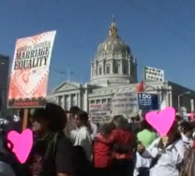Gay and lesbian couples in America's most populous state will continue to be barred from tying the knot as the California Supreme Court ruled 6-1 on May 26 to uphold Proposition 8 that passed in November last year. The ballot measure amends the California Constitution to provide that only marriage between a man and a woman is valid or recognised in California."

The Los Angeles Times reported that although the court ruled overwhelmingly on the constitutionality of Proposition 8, the justices were unanimous in deciding to keep intact the marriages of as many as 18,000 gay couples who exchanged vows before the election. The marriages began last June, after a 4-3 state high court ruling striking down the marriage ban last May.
The San Francisco Chronicle noted in a May 26 editorial that the latest ruling “focused on more technical legal issues, namely whether Proposition 8 represented an 'amendment' to the constitution (permissible through the initiative process) or a more substantial ‘revision’ that could be put to voters only through a constitutional convention or a two-thirds vote of the Legislature.”
“Curiously, the conclusion that Prop. 8 amounted to a mere 'amendment' - and not a change in the basic nature of the constitution - required the justices to downplay the importance of marriage.”
Chief Justice Ronald George further suggested that domestic partnerships and anti-discrimination laws offer same-sex couples the "same substantive core benefits" as their heterosexual counterparts. The justices acknowledged that Prop. 8 does "diminish the rights of same-sex couples," but not so drastically that it would produce a "sweeping constitutional effect."
According to the Times, the court also declined to determine whether same-sex marriages performed outside of California - and not formally recognised by the state prior to the election - would be legal in California.
Five US states - Vermont, Connecticut, Massachusetts, Iowa and most recently Maine - now permit gay marriage, and legislation to allow it is in progress in other states.
Massive protests were held outside the Supreme Court in Sacramento - shortly after the decision was handed down – as the decision was met with anger and disappointment by gay rights campaigners.
“Today’s ruling is a miscarriage of justice. No minority group should have to defend its right to equality at the ballot,” said Marc Solomon from the gay rights group, Equality California, in a statement.
He said the group is committed to restoring the freedom to marry and has “already launched a mobilisation campaign to reach more than 300,000 Californians in the next 100 days in places where we need the most movement.”
California Governor Arnold Schwarzenegger said he would uphold the court's decision, but added: "I believe that one day either the people or courts will recognise gay marriage."
Gay rights organisations have pledged to continue their fight to get same-sex unions recognised as marriages in California as Equality California announced plans to canvass for about 700,000 verified signatures to return to the ballot box in 2010.
Related reading:
Proposition 8 ruling: separate and unequal (San Francisco Chronicle, Editoral)
"The marriage rights of Californians now fall into three categories. Heterosexual couples have access to all rights, responsibilities - and the name - of marriage. Gays and lesbians who were married between May 15 and Nov. 4 can remain so - but cannot remarry in the event of death or divorce. And all other gays and lesbians are prohibited by law from marrying the partner of their choice.
"There is a word for this type of unequal treatment: Discrimination."
California high court upholds Prop. 8 (LA Times)
“(T)he court's definition of what would be an impermissible constitutional revision was also narrow and left gay rights activists nervous and several legal scholars skeptical. ‘It leaves us to the kindness of strangers,’ said Jon W. Davidson, legal director of Lambda Legal, a gay rights organization. ‘They could take away anything.’”
Experts not surprised by ruling to uphold Prop 8 (Associated Press via sfgate.com)
“In the end, the California Supreme Court rejected arguments that the gay marriage ban, passed by the voters last fall, was such a fundamental change that it qualified as a constitutional revision - not just an amendment - and therefore needed to first go before lawmakers.”
